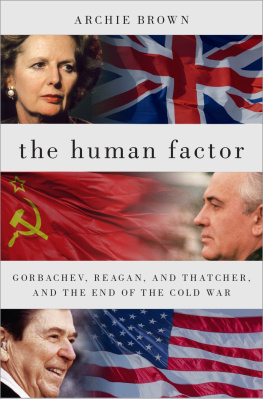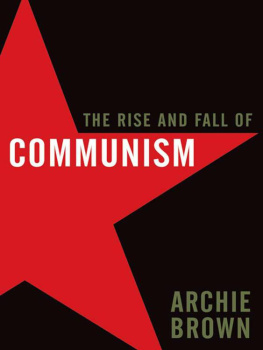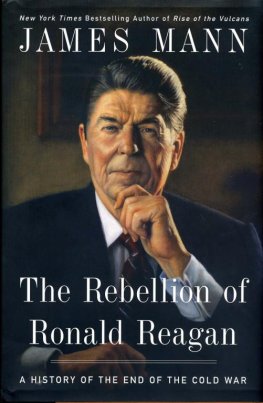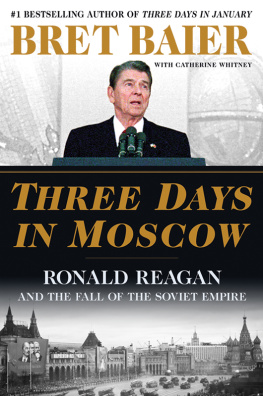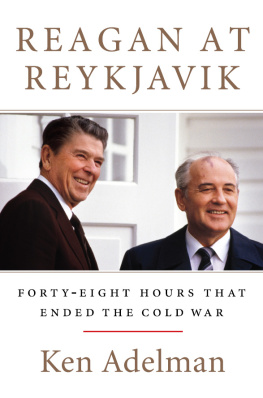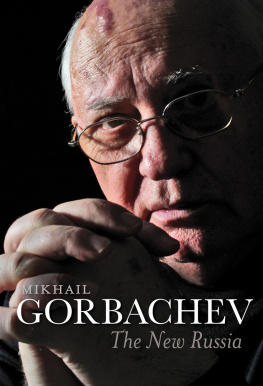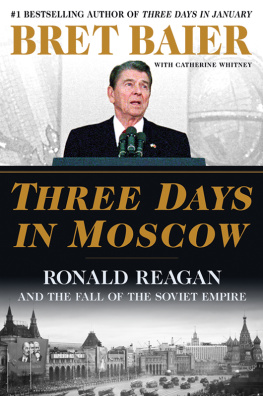Books by the Same Author
The Myth of the Strong Leader: Political Leadership in the Modern Age (2014; with updating new Foreword, 2018)
Counter-intuitive but splendidly argued an ambitious work made more compelling by its breadth, Washington Post
A profound, and wise, bookone of the most important works on politics for a long time, Sir Ian Kershaw
Brown is both an outstanding political scholar and an elegant, witty writer, The Guardian
The Rise and Fall of Communism (2009)
Consistently superb, New York Times
A grimly humorous and richly anecdotal study, Financial Times (Books of the Year)
Superb A hugely readable book, Daily Telegraph
Seven Years that Changed the World: Perestroika in Perspective (2007)
Archie Brown is the dean of Gorbachev experts, Sir Rodric Braithwaite, Moscow Times
the Western scholar who recognized first and most fully the remarkable leadership talents and radical reformist instincts of Gorbachev, Thomas F. Remington, The Russian Review
Archie Browns knowledge of Gorbachev and Gorbachevism is unsurpassed, Vladimir Tismaneanu, Perspectives on Politics
The Gorbachev Factor (1996)
A rich study, as impressive in its sweep as in its details, New York Times
The most fundamental of all the books on perestroika, Sergei Peregudov, Polis (Moscow)
The fullest and most objective analysis of the perestroika period in Western scholarly literature, Georgiy Shakhnazarov, Svobodnaya mysl (Moscow)

Oxford University Press is a department of the University of Oxford. It furthers the Universitys objective of excellence in research, scholarship, and education by publishing worldwide. Oxford is a registered trade mark of Oxford University Press in the UK and certain other countries.
Published in the United States of America by Oxford University Press
198 Madison Avenue, New York, NY 10016, United States of America.
Archie Brown 2020
All rights reserved. No part of this publication may be reproduced, stored in a retrieval system, or transmitted, in any form or by any means, without the prior permission in writing of Oxford University Press, or as expressly permitted by law, by license or under terms agreed with the appropriate reproduction rights organization. Inquiries concerning reproduction outside the scope of the above should be sent to the Rights Department, Oxford University Press, at the address above.
You must not circulate this work in any other form and you must impose this same condition on any acquirer.
A copy of this books Cataloging-in-Publication Data is on file with the Library of Congress.
ISBN 9780190614898
ebook ISBN 9780190614911
1 3 5 7 9 8 6 4 2
Printed by Sheridan Books, Inc., United States of America
Contents
Anti-Ballistic Missile Treaty
African National Congress
British Broadcasting Corporation Summary of World Broadcasts
Central Committee [of Communist Party]
Conventional Forces in Europe
Central Intelligence Agency (US foreign intelligence service)
Commonwealth of Independent States
Council for Mutual Economic Assistance (of USSR and Eastern Europe, known in the West as Comecon)
Coordinating Committee for Multilateral Export Controls
Centre for Policy Studies (UK)
Communist Party of the Soviet Union
Conference on Security and Co-operation in Europe
Federal Bureau of Investigation (US domestic intelligence and security organization)
Foreign Broadcast Information Service (USA)
Foreign and Commonwealth Office (UK) [also FO, Foreign Office]
Freedom of Information (Act, UK)
Federal German Republic (West Germany, prior to German unification, and united Germany today)
Government Communications Headquarters (UK government intelligence-gathering organization)
German Democratic Republic (East Germany when under Communist rule)
transparency, openness
State Planning Committee of USSR
Hoover Institution Archives (Stanford, California)
intercontinental ballistic missile
International Department (of the Central Committee of the CPSU)
Institute of World Economy and International Relations
intermediate-range nuclear forces
researchers in academic, especially policy-related, institutes
Komitet gusudarstvennoy bezopastnosti (Committee of State Security)
Mutually Assured Destruction
memorandum of conversation
Soviet specialists on international affairs
Ministry of Foreign Affairs (USSR)
common name for UK Secret Intelligence Service (SIS)
Multiple Independently Targeted Re-Entry Vehicle
Narodnyy komissariat vnutrennikh del (Peoples Commissariat of Internal Affairs, a forerunner of the KGB)
North Atlantic Treaty Organization
National Intelligence Estimate (USA)
National Security Agency (US Department of Defense)
National Security Archive (George Washington University)
National Security Council (USA)
Organization for Security and Co-operation in Europe (formerly CSCE)
reconstruction; and the name for the period (198591) when Mikhail Gorbachev was Soviet leader
Partito Comunista Italiano (Italian Communist Party)
Royal United Services Institute (UK)
Screen Actors Guild
Strategic Arms Limitation Talks
Strategic Defense Initiative (Reagans anti-ballistic missile project)
Russian term for those who work in agencies with coercive force at their disposal (internal security forces and the military), also known as the power ministries
submarine-launched ballistic missile
Strategic Arms Reduction Talks
United Kingdom of Great Britain and Northern Ireland
Union of Soviet Socialist Republics (Soviet Union)
Collective defence treaty of Soviet and East European Communist states
I use East Europe, with capital letters, to refer to that part of Europe under Communist rule. This term was in use throughout the Cold War to describe what was a political, rather than geographical, entity. East (or Eastern) Europe contained both east and central European states, but the longer and geographically more precise wording is used only occasionally in the book, for its repetition would be a cumbersome substitute for the easily understood politically defined term. For the post-Communist period, in contrast, it would be nonsensical to refer to the Czech Republic (for example) as part of east (or East) Europe.
There is always a tension between consistency and familiarity in transliteration from Russian, especially where peoples names are concerned. In the bibliographical references in the endnotes and, for the most part, in the main text, I have used y for and also for , yu for , ya for , and iy for . I have made exceptions, however. Thus, Andrei Gromyko and Andrei Sakharov were better known in the West as Andrei than as Andrey and they remain Andrei in this book. With names such as Georgiy and Anatoliy, I have preferred familiarity to precise transliteration: thus, Georgy and Anatoly. Use of the Russian soft sign has been avoided, other than in the endnote referencesthus, Yeltsin rather than Yeltsin and glasnost rather than glasnost

